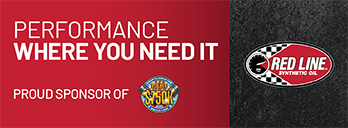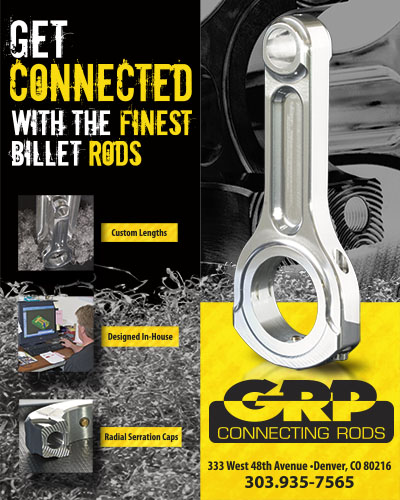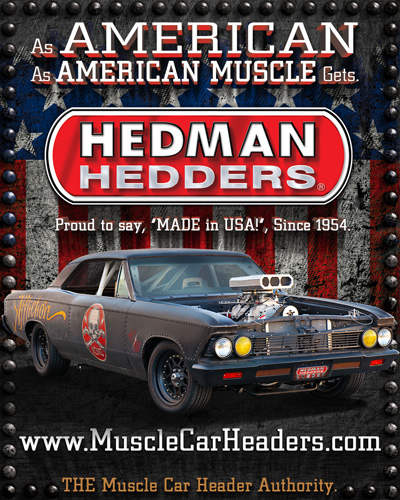FATHERS AND THEIR CHILDREN by Bobby Bennett
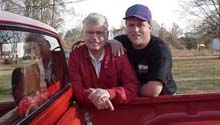 I miss him so much.
I miss him so much.
My dad never drag raced -- never tuned a car, either.
But he held a crucial role in the sport. He inspired me. But I will get back to him later in this article.
One would have to be totally blind to not see the impact that fathers make on their children. The drag strip provides the perfect opportunity for that union.
Proud fathers walk to the starting line to witness their sons’ and daughters' heroics and vice versa. It’s a union that if I have to explain it, you just wouldn’t understand it.
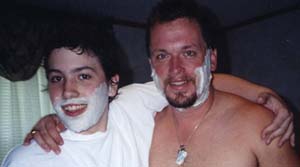 I miss him so much.
I miss him so much.
My dad never drag raced -- never tuned a car, either.
But he held a crucial role in the sport. He inspired me. But I will get back to him later in this article.
One would have to be totally blind to not see the impact that fathers make on their sons. The drag strip provides the perfect opportunity for that union.
Proud fathers walk to the starting line to witness their sons’ and daughters' heroics and vice versa. It’s a union that if I have to explain it, you just wouldn’t understand it.
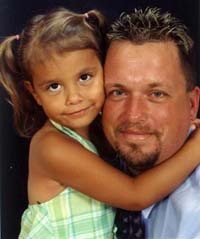 Some years ago, during the infancy stages of
Torco’s CompetitionPlus.com, I wrote a piece that explained in detail that very
point.
Some years ago, during the infancy stages of
Torco’s CompetitionPlus.com, I wrote a piece that explained in detail that very
point.
The facts don’t lie.
In homes where a father figure was present, nine times out of ten the child often emulates what the dad does. If dad is a drag racer, it's an almost certainty that his children "pretend" to be racers. We can all relate to it. As a father myself, I've watched many times as my children emulate my job.
Even the psychologists in today's
studies admit that fathers hold an important role in the development of their children.
Our society has noticed that the effects of not having that male figure in
their lives can have an adverse reaction more times than not.
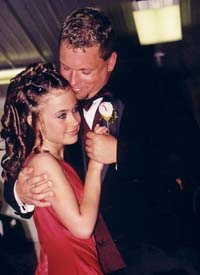 Economic Deprivation and Early Childhood Development of Child Development 65
lists statistical analysis of the behavior and intelligence of children living
in fatherless households as having "significant detrimental effects."
Growing up in a fatherless household remained a statistical predictor of
behavior problems even after adjusting for differences in family income. Even
the U.S. Department of Health and Human Services agrees that fatherless
children are at a dramatically greater risk of drug and alcohol abuse.
Economic Deprivation and Early Childhood Development of Child Development 65
lists statistical analysis of the behavior and intelligence of children living
in fatherless households as having "significant detrimental effects."
Growing up in a fatherless household remained a statistical predictor of
behavior problems even after adjusting for differences in family income. Even
the U.S. Department of Health and Human Services agrees that fatherless
children are at a dramatically greater risk of drug and alcohol abuse.
OK -- that gives us the scientific backing for our statements, but did
we really need it? It’s something we already knew.
Just because a driver has a child who tags along with him to the races doesn't necessarily ensure that the child will be a driver. There are prime examples in racing. But, then again, the odds are greatly in the favor that they will and in most cases will take it to the next level.
a d v e r t i s e m e n t
Click to visit our sponsor's website
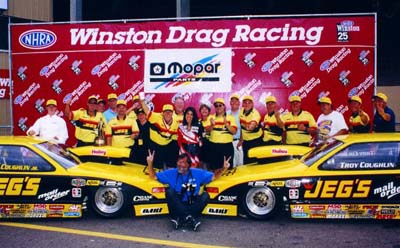 Let's look at a few examples. Hands
down the most recognized father would have to be Jeg Coughlin. The former drag
racer turned mail order magnate has the most offspring racing on the
professional level of anyone in the world of drag racing. The successful
achievements of Jeg, Jr., Troy,
Mike and John are well documented in the sport. Jeg is almost always present
with his sons at the racetrack, and admits that he's really proud to see what
they've accomplished.
Let's look at a few examples. Hands
down the most recognized father would have to be Jeg Coughlin. The former drag
racer turned mail order magnate has the most offspring racing on the
professional level of anyone in the world of drag racing. The successful
achievements of Jeg, Jr., Troy,
Mike and John are well documented in the sport. Jeg is almost always present
with his sons at the racetrack, and admits that he's really proud to see what
they've accomplished.
"It's a great feeling," said Coughlin when he recalls the closeness
that the sport has brought to him and his sons. "I feel it's a safe, clean
and growing sport. I am proud that I was part of the sport of drag racing in
the beginning and I am even more proud to be a part of the sport now and watch
my sons grow within the sport. I often thank Wally Parks for giving my family
such a great tool to grow together as a family.”
Each family has its own set of requirements before the torch is passed from one generation to another. Earning the right to drive is considered a rite of passage.
However, in the family it was not something that was afforded to his children just because he raced.
The Coughlin driver requirements were simple. Before any of them got behind the wheel they had to understand sportsmanship and safety 100% before he ever went down the track. They also had to have the desire and ability to race.
Then there was a father and son that I grew up in the sport with – Scotty and Scott Cannon.
Scotty knew that he could trust Scott Jr., unconditionally in a sport where tuning talent and drivers could be bought or sold with the right amount of money. It was a natural when he stepped away from the Pro Modified car in 2005 that he looked to his son.
"I knew Scott wanted to race," explained Cannon, who first brought his son into racing as a crew member on his Pro Modified team. "He had raced motorcycles and that kind of stuff and I knew he was real dedicated to whatever he did regardless if it was racing the motorcycle or helping me on the car. He didn't much like racing when he was young, but as he got older, his interest grew. And I am glad."
Cannon admitted that he worked better with Scott, Jr., when he got older. "I'll be the first to admit it," confided Cannon, who has two other sons, Brandon and Destin. "I'm not good with smaller children. I'm better with them when they get older. Scott and I didn't always do a lot of the going to movies things and stuff like that, but that didn't mean he wasn't important in my life. He was very important."
Cannon recalled, "When he first started to show an interest in cars, I didn't know what to think because he wouldn't come to me for help. This was when I was real heavy hitting in Pro Modified and I would kind of nudge him every once in a while and let him know that his dad did kind of do this thing for a living. I guess it was his way of letting me know that he didn't want to ride on my success. He wanted to do his own thing and I can respect that."
a d v e r t i s e m e n t
Click to visit our sponsor's website
MY STORY
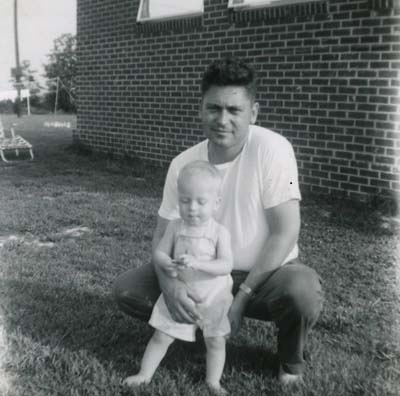 On Mother’s Day, I penned a tribute to my mother as a guidance counselor in my
life before her death. But, let me tell you, she didn’t hold the responsibility
of shaping my life alone.
On Mother’s Day, I penned a tribute to my mother as a guidance counselor in my
life before her death. But, let me tell you, she didn’t hold the responsibility
of shaping my life alone.
I was the only son of three children, so that should provide an inkling of the role “Senior” held in my life.
Dad’s education was the old school. He quit school in the eighth grade to help support his grandparents through working in the Carolina textile mills. That’s all he knew to do – work. But, he had time for me. He made time. I can remember as early as four years old the times Mom would take me to Dad's work to spend the evening with him. I can remember falling asleep on a makeshift cardboard bed at his job many nights. He was only able to do this because he was the only person left working. He was first to arrive and last to leave by many hours.
“If you want to get anywhere in life – you work,” he said. “You give a man an honest day’s effort and the end result is that you can look him in the eye.”
Dad had a love for cars but wasn’t a Corvette or Camaro man. He loved those classic Galaxies and the Ford Falcons.
Working, supporting his family, and tinkering with cars fueled his passion. He was a self-made auto mechanic and body repairman on the side. In fact, when I think of it, there wasn’t much he couldn’t do.
Detailing a car? He could make dirt track car shine like a show car.
He was a man who lived by the convictions of God’s word. Dad taught me the Lord’s Prayer and every night our regimen included reciting that prayer knelt in my parent’s room.
I’m not trying to preach, just pointing out that was a foundation he established early in my life. It was the most profound statement he could make in my life to compensate for those long hours at work.
Senior’s work week spanned from 6 a.m. until 10 p.m. at night, Monday through Friday. Saturdays were reserved for taking care of household business and helping his elderly grandparents. He was big on taking care of his elders. His grandparents were his parents because he was given away as a child.
Sundays were for church and family time, no exceptions.a d v e r t i s e m e n t
Click to visit our sponsor's website
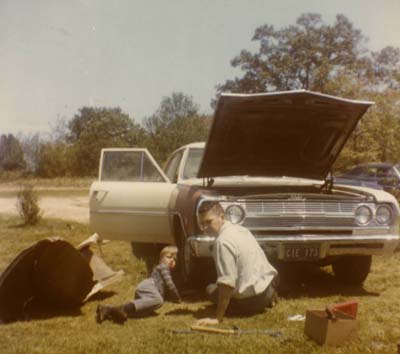 That’s the way he showed his love -- he
provided. He ensured that we never did without. He didn’t want us to hurt like
he did growing up.
That’s the way he showed his love -- he
provided. He ensured that we never did without. He didn’t want us to hurt like
he did growing up.
That foundation of faith from Dad is what paved the way for my involvement in drag racing. We lived barely a mile from Spartanburg Dragway and every Saturday night I could hear the cars into the wee hours of the morning. I gravitated towards that harmony of horsepower. But when I asked for a visit, he told me that $5, by 1979 standards, was too much to spend on a ticket.
Mom chimed in that she didn’t want me around that fighting and beer drinking.
Those of you who know me know exactly how I handled that situation.
I hopped on my trusty drag racing bicycle (a story for another time) and pedaled to the track. I’m not going to say this was a spur-of-the-moment action. It was premeditated all the way. I had done enough research to know what it took to get in the gate.
The plan was – go there and stay an hour or so -- and pedal back home before anyone missed me.
The ride there was quick because it was virtually a downhill trek. Remember that tidbit for later in the story.
I rode up to the gate and the man at the gate asked me for $5. I knew that children 11 and under got in free, so I offered that I was only 11 years old. He gave me the pass through.
My eyes were so fixated on the handful of Modified Production cars testing that day. Their high winding Gene Fulton small blocks and Doug Nash 4-speed transmissions hooked me like a fish. I was mesmerized and couldn’t move. Following a gear-jamming run by Bob Earnhart’s Formula 2/E Modified Production Stingray (for those Modified eliminator diehards), I pumped my fist in approval. That elation was shattered within moments.
Dad was standing right beside me and I knew at that moment, the party was over.
“It’s time to go home,” he said, as he started walking towards the gate.
I think I discovered the feeling of “dead man walking” at that point.
“How did you get the money to get in here?” he asked.
My eyes welled with tears as I confessed my transgression.
“You’re going to make this right,” he said.
Sniffling, then outright crying . . . I told the man I was really 12 years old. The man at the gate, Paul Johnson, smiled and asked my dad if I could stay there for the rest of the day.
“No, I have to teach the boy a lesson,” he said. “He’s not going through life cheating and stealing from people and while you my have forgiven him, it’s not doing him any favors in life.”a d v e r t i s e m e n t
Click to visit our sponsor's website
Dad then instructed me to ride home and he’d there to deal with me. Little did I know that as I pedaled home (uphill all the way) that dad had brokered a deal where I could help clean up the track after the races and in return he’d pay me $5 and grant free admission.
He wouldn’t even give me a ride home. We had the talk once I got home. I think something clicked in his heart. Dad knew destiny was knocking.
“You really want to go?” he asked.
“I really want to be there so bad,” I responded.
I got the lecture on dishonesty. I still remember that talk. I am still ashamed.
“We’ll go next week,” he said. “You and I will go and make a day of it.”
Dad was big on making Saturdays “our time.” I can remember that day, sitting in the stands with a clipboard and a pencil writing down the numbers of every car, driver’s name and car make that ran. He was my auto advisor, revealing the make and model of every car I couldn’t.
He told me of the job opportunity later that night. That man, Mr. Johnson, the one who made it all possible, would return later in my adult life to prove destiny was in my favor.
Dad watched my endeavors at the track and supported them. He made sure I got to the track every Saturday. He even gave up his Saturdays, working at the drag strip as well (with no pay), just to ensure that I was able to keep my job.
When I decided to start a little magazine (crude, handwritten on notebook paper, photocopied with Polaroid pictures), he provided the funds to run the copy machine. His only request is that he got the first issue each month.
As I grew older, we drifted apart because I did my tour of duty as a rebellious teenager. But, the older I got, we came back together as friends.
Dad helped through my tough divorce and became the driving force behind my
pursuit of a career in drag racing. I’ll be honest, he was nervous when I quit
my job of 13 years in a textile factory to pursue drag racing full-time. He had
a right to be. I was nervous, too.
a d v e r t i s e m e n t
Click to visit our sponsor's website
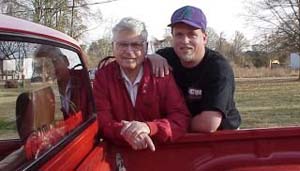 When I told him of the plan to start
what would later become Torco’s CompetitionPlus.com, he smiled because somehow
he knew we’d make it.
When I told him of the plan to start
what would later become Torco’s CompetitionPlus.com, he smiled because somehow
he knew we’d make it.
Dad took pride in being my ride to and from the airport. That was a job he took
seriously. He always took comfort in knowing that Roger Richards was traveling
with me because he knew that I would be safe with him.
When I would come home from a race, spot him sitting on the bench at the
airport, he’d smile knowing I made it home safely. That smile was increased
after the dangers of flying became apparent on September 11, 2001.
He always told me, “If something ever happened to you. I think my heart would
break beyond repair.”
After he told me that, I changed my lifestyle. I stopped living life on the
edge so much. He always made it a point to tell me how proud of me for the man
I had become.
Christmas of 2002 would be the last one for us. The next day he was diagnosed
with incurable lymph node cancer. That was the result of his years working as a
welder in those textile mills – providing. He sacrificed his life so that we
would have a better life.
I always went off to the races in the time after that praying that God would
not let me be on the road when he passed. The last month of his life, I had
planned to stay at home and take a break from racing. When he heard of that, he
summoned me to his bedside and counseled me that I had a duty to provide. He
made it a point to let me know that he was in God’s hands and that he’s be
taken care of.
a d v e r t i s e m e n t
Click to visit our sponsor's website
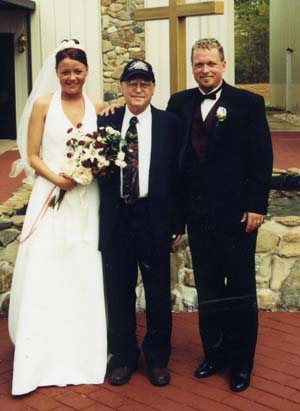 Dad passed on the one weekend I was
home in the midst of a five out of six weekend swing.
Dad passed on the one weekend I was
home in the midst of a five out of six weekend swing.
The cancer was brutal on him and it got to the point that I prayed that God
would take him on home. I couldn’t see him hurt any more. He didn’t deserve it.
I finally told him it was okay to let go.
Dad knew my life was coming together with stability. I had met my wife, Christy,
and together we were headed in a good direction. He really liked her. God
granted him the strength to attend our wedding.
That was the last time he’d go out
before becoming bed-ridden for two months.
Two days before he died, with barely
enough strength to speak, he made it a point to put his arm around my neck
(with help) and say, “I love you and I’m proud of …”
And those were the last words he ever spoke to me.
As I sat at his funeral, following my delivery of his eulogy, I remembered a
moment he and I had shared just days following the diagnosis of death.
The memories returned in a flurry, especially when, I discovered the same Mr.
Johnson just happened to be the funeral director. That was the first time I had
seen him in over 20 years. I knew it was destiny.
I recalled that day in December when Dad and I were in the garage, sorting through boxes of years gone by, when I noticed a
tattered and torn copy of that old magazine I published as a kid.
“I guess we all have a destiny in life,” I told him as I presented the
magazine.
He nodded in agreement.
Yeah, we all have a destiny. His destiny was to be my Dad.
Most importantly, I was destined to be his son.
| {loadposition feedback} |

